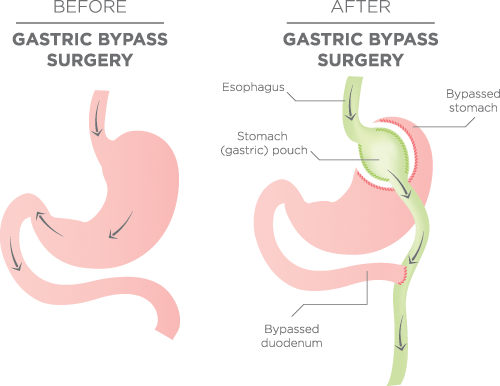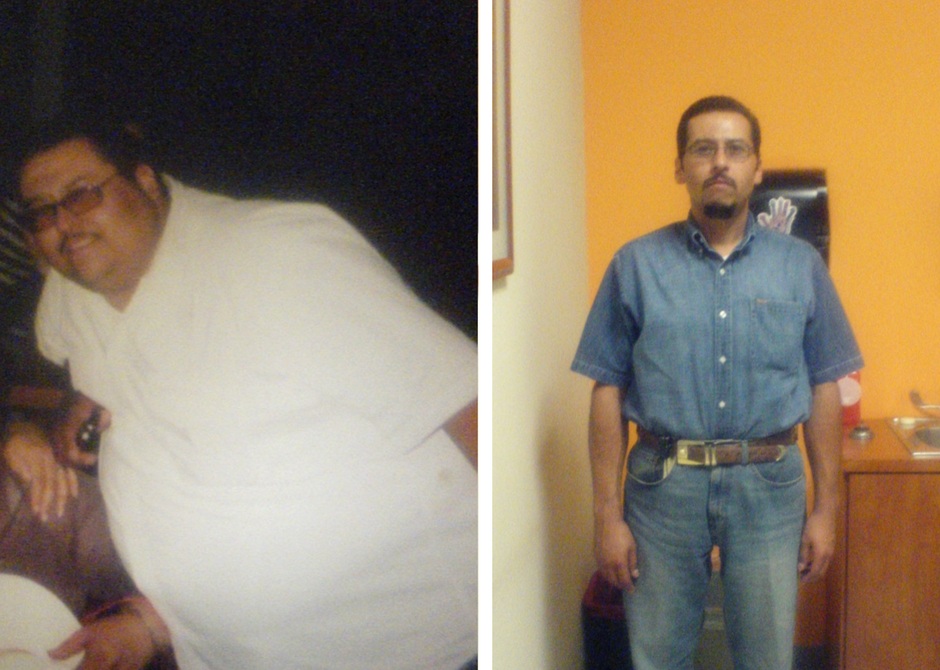“gold standard” metabolic surgery that reduces the size of the stomach and allows food to bypass part of the digestive system.
The gastric bypass is a mixed type procedure that decreases the size of the stomach and the first part of the small intestine, thereby diverting food directly into the middle part of this organ. In normal digestion, food passes through the stomach and enters the small intestine, where most calories and nutrients are absorbed. In the case of gastric bypass, patients not only feel full faster and eat less, but also only a small amount of calories are absorbed.
This is a combined procedure, which means that there is a restrictive element (smaller stomach) and a malabsorptive component (less digestion of food and absorption of calories that will normally be passing through the initial part of the small intestine).
This procedure allows the patient to lose approximately 80% of the excess weight, therefore is widely performed in the country to treat severely obese patients. Gastric bypass surgery is highly effective to treat comorbidities such as diabetes mellitus type 2, hypertension, sleep apnea, among others. The utility of the bypass to significantly improve or cure diabetes is clear. It is one of the so-called 'metabolic' surgeries because it has been shown to improve and/or revoke the metabolic syndrome, since it decreases the production of insulin by the pancreas.
EXCESS WEIGHT LOSS:
UP TO 80%.
TYPE OF PROCEDURE:
RESTRICTIVE & MALABSORPTIVE.
PERFORMED BY LAPAROSCOPY.
NOT REVERSIBLE.
What are the ADVANTAGES?
Significant loss of around 80% of excess weight and most reliable technique in the long term. Typical maintenance of more than 50% excess weight loss (ASMBS).
It is the “gold standard” metabolic surgery, which highly improves diabetes type 2 in 95% of patients or causes remission in around 80% of cases (ASMBS).
Substantial improvement of the vast majority of obesity related conditions, especially high colesterol, high blood pressure, sleep apnea, gastroesophageal reflux disease, and more.
Preferred bariatric procedure for the highly obese due to the significant and sustained long-term weight loss.
Produces favorable changes in gut hormones that reduce appetite.
No prosthesis is placed, so there is no possibility of rejection.
Performed by laparoscopy, which means shorter recovery time, fewer and smaller incisions and less pain.
what are the POSSIBLE RISKS/CONS?
Like any other surgery, the gastric bypass has potential complications that will be addressed below, although it is important to note that the percentage of patients who present them is relatively small. Some of the potential risks are:
It is a more complex procedure thus presents a higher risk, including:
Possibility of long-term vitamin and protein deficiency, so patients must take vitamin supplements for several years after the procedure.
Possibility of ulceration and intestinal obstruction.
Increased risk of gallstones due to rapid weight loss.
Possibility of Dumping syndrome when eating sweet foods, including symptoms like nausea, reflux and diarrhea.
Potential DVT (blood clot in deep leg veins)
Patient monitoring for a few years is advised to prevent any complications in the long term.
To fully assess and understand all possible complications and side effects, it’s important to talk your bariatric surgeon in regards to your specific health condition.
Are you a candidate for gastric BYPASS?
The gastric bypass surgery is indicated:
In any patient with a body mass index above 35 and associated comorbidities.
In patients with a BMI of 40 even if they do not present any related conditions or more than 100 lbs (45 kgs) overweight.
In patients with diabetes mellitus type 2 this procedure should be the first choice.
In patients who have undergone other bariatric procedure (gastric band or sleeve) and have not obtained the desired results.
In patients who have tried, for a period of time, diverse methods (exercise, nutritional help, support groups) for the definitive weight loss without achieving successful results.
Interested in the Gastric Bypass? Let us help!Gastric Bypass Success Stories
*Results may vary
*Results may vary





